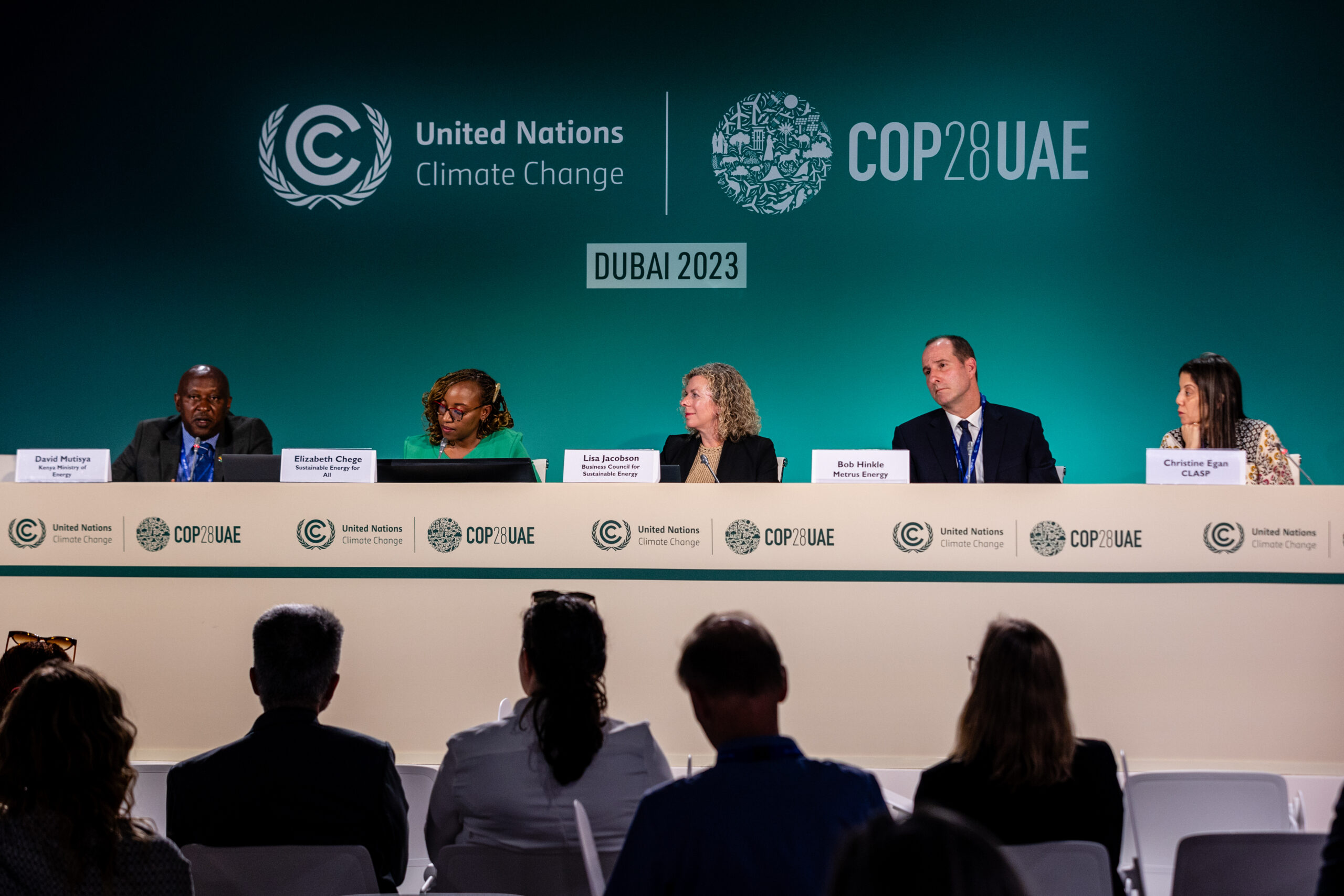By Laura Tierney, Vice President, International Programs, BCSE
After a whirlwind two weeks in Dubai, UAE, the BCSE team and delegation have returned from the 28th Conference of the Parties (COP 28) to the United Nations Framework Convention on Climate Change (UNFCCC) already reflecting on BCSE’s activities and the negotiated outcome. The landmark COP 28 agreement made important progress on funding loss and damage, accelerating energy efficiency and renewable energy deployment, and advancing the global energy transition.
Here are four takeaways of significance for BCSE on COP 28:
Articulation of the energy transition pathways to meet the goals of the Paris Agreement
With the passage of the UAE Consensus and the completion of the progress report on the Paris Agreement, known formally as the Global Stock Take (GST), a clear signal was sent to the international community – to government leaders, business executives, investors, and citizens from all corners of society – about the acceleration of the energy transition needed to limit global warming to 1.5 ⁰ C by mid-century.
For the first time in the history of the United Nations Framework Convention on Climate Change (UNFCCC) process, the negotiations produced a text that calls for countries to “transition away from fossil fuels in energy systems, in a just, orderly, and equitable manner.” Furthermore, it rightly elevated a broad set of low- and zero-carbon options that can move us more quickly toward net-zero emissions by 2050.
Energy efficiency and renewable energy recognized as key solutions in realizing the clean energy transition
Included in the UAE Consensus is a firm call for the “tripling of renewable energy capacity globally and doubling the global average annual rate of energy efficiency improvements by 2030.” These are proven and existing technologies that are cost-competitive in many locations. These demand-side management and clean energy generation technologies can deliver immediate emissions reductions – but increased scale and pace of deployment are urgently needed. Setting a near term target of 2030 underscores the urgency of action needed in this critical decade.
Better yet, 130 countries pledged support of these energy efficiency and renewable energy goals during COP 28. BCSE joined the Mission Efficiency Call to Action launched at COP 28, which includes public and private sector supporters, and pledges to work with governments on policies to utilize and deploy energy efficiency systems, financing, and technology solutions. Similarly, BCSE is one of more than 250 supporters of the 3X Renewables Campaign that includes global companies, business associations, and stakeholders calling for 11,000 GW of installed renewable capacity by 2030.
With pledges and targets now set, BCSE looks toward public-private partnerships to deliver finance, technology, and policy solutions that can realize these important goals.
Acknowledgement of the loss and damage impacts felt by most vulnerable countries
The announcement of the operationalization of a new fund to address loss and damage on the first day of COP 28 answered a long-standing and urgent call for assistance by developing countries. The new fund will be capitalized with nearly $700 million, including a $17.5 million pledge by the United States.
The recognition of the severe climate impacts on the most vulnerable and least responsible countries is a significant step forward for the international community. Remaining shared challenges include identifying adequate levels of international climate finance needed for both the loss and damage fund and overall support to developing countries.
The impacts of the changing climate are also a shared reality which this fund begins to address. In the timeless words of the COP 23 Fijian Presidency, “We are all in the same canoe – not just the island nations but the whole world. No-one is immune to the effects of climate change. All 7.5 billion people are in the same boat.”
Climate action is indeed everyone’s business
The BCSE delegation to COP 28 was the largest in its three-decade long history as an accredited observer, bringing 39 companies and organizations and more than 150 individuals to the annual UN Climate Change Conference. UAE reports a record-setting 85,000 participants at the two-week conference.
The growing size of the conference, while a concern to some, reflects the reality that the implementation of the Paris Agreement is a redirection of the global economy. The scale of such a task requires a whole-of-society conversation.
BCSE believes the increased interest and participation of businesses and civil society actors at the COP is an opportunity for additional collaboration and outreach. We look forward to continuing this work at home and next year at COP 29 in Azerbaijan.
For more information on the BCSE’s engagement at COP 28, please visit bcse.org/cop28 and read BCSE’s Commitment to the Energy Transition and Climate Action.
About the Author: Laura Tierney is the Business Council for Sustainable Energy’s vice president of international programs.

